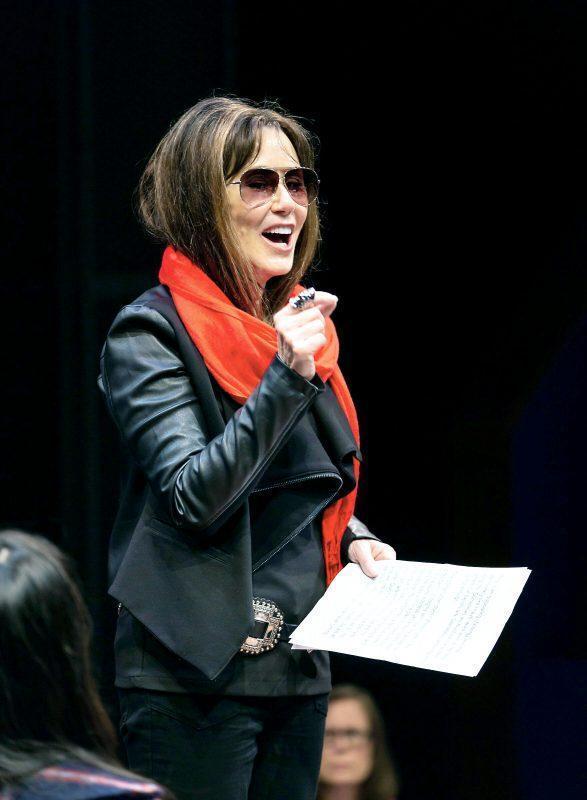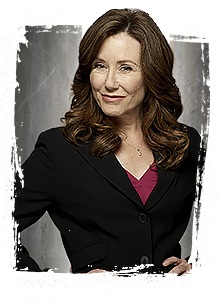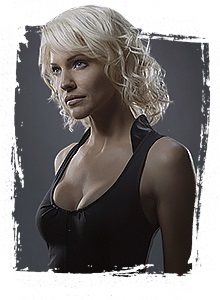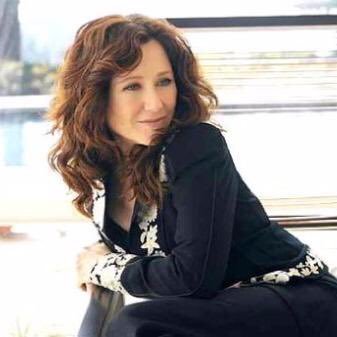
Steinem, Audience Members Share Their Stories in “Gloria: A Life”; Mary McDonnell Stars in Emily Mann’s Drama at McCarter
Donald H. Sanborn III
September 25, 2019

McCarter Theatre is presenting Gloria: A Life. Originally directed for off-Broadway by Diane Paulus, this groundbreaking drama has been restaged for McCarter by playwright Emily Mann. This production opens Mann’s 30th and final season as the company’s artistic director and resident playwright.
Gloria: A Life was conceived by actor Kathy Najimy. Najimy envisioned a show in which feminist activist and journalist Gloria Steinem would portray herself. Producer Daryl Roth presented the concept to André Bishop, the producing artistic director of Lincoln Center Theater, and Mann was commissioned to write the script. Ultimately Christine Lahti portrayed Steinem in the off-Broadway production, which opened at the Daryl Roth Theatre in 2018.
In McCarter’s current production Mary McDonnell portrays Steinem, who shares her life story with the audience in the first act. The shorter second act offers members of the audience an opportunity to react to the play, and share their own experiences. “The first act is Gloria’s life, and the history of the movement — and how those reflect on each other; the second part is about the audience,” Mann explains in a promotional video.
McCarter’s Berlind Theatre is reconfigured so that the show is performed in the round, which entails placing a portion of the audience onstage. This seating arrangement develops a theme of the play, as we discover during a central scene in which Gloria meets Wilma Mankiller, the first contemporary female principal chief of the Cherokee Nation, whose name is “a title for someone who guards the village.”
Wilma tells Gloria that the Cherokee language eschews gendered pronouns, and that the “heart of our governance is the caucus — an Algonquin word that means ‘talking circles’ — it’s a consensus among women and men.”
The play also acknowledges the guidance Steinem received from African American women such as Dorothy Pitman Hughes, who helps her overcome her fear of public speaking, and Florynce “Flo” Kennedy, the civil rights lawyer who speaks with her at rallies in the South. “The truth is, I learned feminism from black women,” Steinem tells us.
We learn how the unsavory assignments Steinem accepts in her determination to establish herself as a journalist, coupled with her adversarial relationships with other outlets, lead her to cofound the magazine Ms. We also hear the initial reactions to it — appreciative letters to the editor, as well as critical disdain.
Mann’s intelligent script never feels episodic, because the events of Steinem’s past are depicted with two specific purposes: demonstrating how they made her who she is today, and drawing parallels between past and current events, such as the 1970 Women’s Strike for Equality, and the 2017 Women’s March.
This concept is developed by the production, of which Elaine J. McCarthy’s projection design is a crucial component. Live performances are deftly juxtaposed against video footage — at times even blending those two elements, so that the actors seem to appear in historic clips.
The costumes by Jessica Jahn enhance the production’s authenticity. There are numerous photos of Steinem wearing black, and that is the predominant color with which Jahn has outfitted McDonnell. However, this is punctuated by other colors as required by given scenes. In a memorable tableau a photo of the real-life Steinem, wearing a bright red scarf for her speech at the Women’s March, flanks McDonnell wearing the same outfit for the play’s depiction of the event.
Wilma Mankiller’s outfit echoes the bright palette employed by the cozy, opulent rugs that have been placed on the stage. This unifies the costumes with Amy C. Rubin’s economical but inviting scenic design, which chiefly consists of a table and cubical seats, punctuated by stacks of books.
McDonnell, who previously appeared in Mann’s off-Broadway play Still Life, delivers an impeccable performance that is by turns fiercely impassioned and warmly affable, authentically capturing Steinem’s vocal inflections — particularly during the segment depicting the 2017 Women’s March. McDonnell convincingly depicts Steinem’s vulnerability, as well as her resolve.
Much of Gloria’s vulnerability stems from her complex relationship with her mother, Ruth, who was at one time a journalist herself. (The published script is dedicated to Steinem’s mother, as well as Mann’s.)
Through body language McDonnell infuses Gloria with a loving reverence for certain objects, such as the beaded necklace that is given to her by Wilma, or a book that was left to her by her mother. McDonnell underlines the extent to which Steinem cherishes these items, associating them with a powerfully emotional memory.
In telling Steinem’s story McDonnell is aided by an all-female, racially diverse ensemble. These performers are adept at portraying multiple roles — supportive mentors or devotees of Steinem, as well as some of her vicious detractors.
Members of the ensemble include Patrena Murray, who previously appeared in the off-Broadway production; Gabrielle Beckford, who is spirited as Dorothy Pitman Hughes; Mierka Girten, who delivers a poignant performance as Steinem’s mother; Erika Stone, who shines in her portrayal of Wilma Mankiller; Brenda Withers, whose fiery portrayals include one of Gloria’s nastier critics; and Eunice Wong.
McDonnell begins the second act by stepping out of character to remove any trace of a fourth wall. “I’m Mary,” she offers. “Welcome to Act Two.” Ensemble members explain that the discussion is “a talking circle. We will be learning from each other.”
The discussion was initiated by special guest the Rev. Maureen Gerald, a therapist and congressional interfaith advisor for New Jersey’s 12th District. Gerald described herself as a “disruptor,” adding that she tries to think about “our common thread.” Audience members’ remarks tended to echo appreciative comments by readers whose letters to Ms. are heard in the first act. Indeed, one woman described the magazine as “a source of hope for me; I still subscribe.”
One audience member hosts panel discussions about the role of women in science fiction, and makes it a point to include African American women in those talks. Another woman recalled that when she attended law school in the 1980s “there were no women’s restrooms.”
The first man who addressed the room admitted finding it “scary” to do so, but he reflected that “my mom must be a superhero,” because “she was a champion of hope,” despite the societal challenges she faced. The other male participant reported that, as a teacher, he incorporated Wilma Mankiller’s philosophy about non-gendered pronouns. He added that Steinem is “an idol of mine.”
Early in the show Gloria approvingly remarks that modern young people are “just not accepting old divisions of race and gender.” McCarter’s production of Gloria: A Life develops this theme by blurring divisions between past and present, video footage and live performances, and even between characters, actors, and audiences.
As a playwright and director Emily Mann opens her final season by offering audiences a show that invites them to engage in an inclusive discussion of America’s past and present. Gloria: A Life is the community-building call to action that many essayists recently have been calling for theater to be, and it is a moving tribute to both the playwright and her subject.











